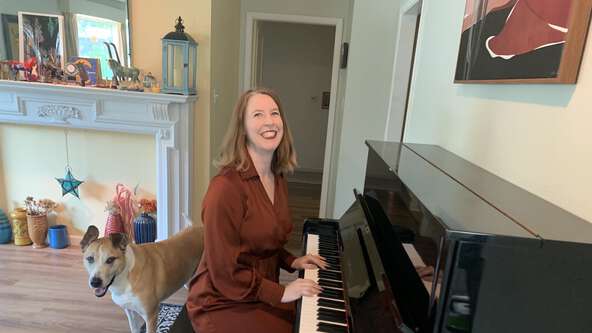Choir Gives Grievers a Voice and Path for Grief Journeys

When Lauren DiMaio arrived at the prestigious Berklee College of Music in Boston, she already was no stranger to grief having lost five loved ones before she was 21. Her plans to become a jazz singer changed after she learned about music therapy there, she told Tulip Cremation.
Later, while working in bereavement services at a North Carolina hospice, she decided to try a new format for grief support that gathered as choir, she said.
“To me, it made perfect sense to have a choir because that’s where people make connections and grief is so much in the voice, if you think musically. Your life is changed when someone dies. And our voice is our identity. So, it made perfect sense to work with the place and the sounds where grief is, whether it is speaking about it, or crying, or wailing or the silence. Voice is a very powerful instrument and very vulnerable. So, let’s take that vulnerable aspect of ourselves and put it in a place where we can really build a community,” she said.
She used the grief choir in North Carolina for research, eventually writing a dissertation for her Ph.D. about the program. During the three years of the choir, some people came and went while others stayed for the entire time. It was open to both staff and families. People were encouraged to bring a song that honored the person or persons that had died.
No one was required to have musical experience or to sing until they were ready. “I am very passionate about people being musical even if they don’t think they are,” DiMaio explained.
DiMaio also believes that taking the choir into the public provided the opportunity to normalize grief in the wider world.
“I don’t think grievers are treated very well in our society. I wanted to have a music therapy group where we would go out and perform in the community, and say, ‘Grief is complex and it’s not what you think and it’s not taboo, and we are going to have a recital about it.’ And so that was a nice mesh and complement to our traditional grief groups. This group had something they could go out and share.”
Now living in Texas and working as an assistant professor of music therapy, DiMaio leads a new grief choir. As far as she knows, it is the only one in the country. Though she’d like to see the movement grow, she urges anyone who wants to launch one to make sure they work with trained, professional music therapists. Music therapists have rigorous training and certification and can best provide the support grievers need, she says. “Knowing what you are doing is so important, especially with grief. There are traumas and so many vulnerable things that can happen.” There are more than 9,000 certified music therapists around the country. She worked with two as part of the North Carolina-based grief choir and says she can help anyone who is looking for one.
She says that all are invited, and the grief choir will continue every semester at TWU. Some people come and just listen and perhaps cry.
As evidence of healing power of the grief choir, she recalled one woman who joined to honor her husband, a musician, who had died. At first, she would silently sit and cry. But later, she began singing and eventually she sang a solo for a version of a Jewel song that evolved into the choir’s anthem. “This beautiful alto voice came out of her … her voice was soulful and could capture the pain and beauty of her grief and it really became in many ways an anthem for the grief choir … to hear her go from the sound of crying to this beautiful solo was such a testament of the power of her and her resilience and her ability to adapt, grow and change and never forget the love she had with her husband and to honor him in music.”
You can find more information about DiMaio’s grief choir on the Texas Woman’s University website.